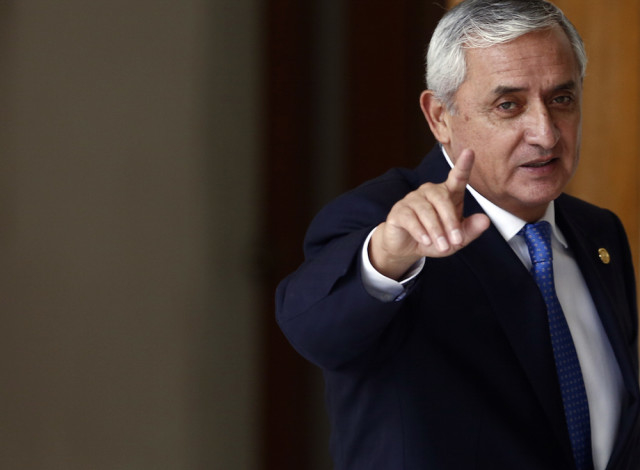President Otto Perez Molina has resigned amid a corruption scandal after a judge issued an order to detain him in the case. Molina arrived at court Thursday to hear the charges against him. Here’s what to look for as the case moves forward.
What are the allegations against Perez Molina?
Prosecutor Thelma Aldana had said the president is suspected of illicit association, fraud, and receiving bribe money in connection with a conspiracy that is believed to have bilked the government out of millions of dollars. Officials allegedly took bribes in exchange for letting businesses evade import duties through the customs agency. Former Vice President Roxana Baldetti is already in jail awaiting trial on similar accusations. Both deny any wrongdoing.
Spokesman Jorge Ortega said Perez Molina, 64, submitted his resignation at midnight Wednesday local time.
“This strengthens the rule of law,” Jorge de Leon, Guatemala’s human rights prosecutor, said of the detention order against Molina Perez and his subsequent resignation. “No one in the country is above the law.”
A growing protest movement brought together Guatemalans from all walks of life demanding that Perez Molina step down. Business leaders and even Catholic church officials had called for Perez Molina to resign in recent weeks as the investigation of the customs fraud ring has grown wider and hit more officials.
How did this come about?
The corruption scandal, uncovered by prosecutors and a United Nations commission probing criminal networks in Guatemala, involved a scheme known as “La Linea,” or “The Line,” in which business people paid bribes to avoid import duties through the customs agency. The ring is believed to have defrauded the state of millions of dollars.
Baldetti’s former personal secretary was named as the alleged ringleader.
Protesters have filled the streets almost daily over the scandal, demanding not only that Perez Molina step down but that next Sunday’s presidential elections be postponed. He says delaying the vote would be against the law.
The U.N.’s International Commission Against Impunity said in a report released in mid-July that the country’s elections are rife with illegal money and corruption is the glue holding the system together. Political parties consistently spend far more money than they report taking in and several regularly exceed spending limits without consequence.
Who becomes president now?
Vice President Alejandro Maldonado is constitutionally in line to assume the presidency. Maldonado, a conservative lawyer and former Constitutional Court judge, became vice president this year when Congress picked him from a shortlist of Perez Molina nominees. He replaced Baldetti, who resigned May 8 because of the corruption scandal. Maldonado would presumably remain in office until the winner of upcoming elections is inaugurated Jan. 14, 2016.
The first round of elections is on Sunday, pitting a wealthy businessman and politician against 13 other candidates, including a comedian with no political experience, a former first lady and the daughter of an ex-dictator accused of genocide. If none of the candidates reaches 50 percent, a runoff will be held Oct. 25.
How will the legal case against Perez Molina proceed?
Timetables for criminal prosecutions are spelled out by Guatemalan law. For example, after Perez Molina appears before a judge following his detention order, prosecutors have three months to present evidence for a judge to order a trial. However there are often significant delays due to legal maneuvers, and it usually takes about a year to bring a suspect to trial. That could differ for Perez Molina depending on whether his case is linked to that of other suspects in the corruption probe. The courts could also freeze his assets, as has happened with Baldetti.
What does it all mean for Sunday’s election?
Not much, apparently. Political analyst Oscar Pelaez Almengor says the legal process against Perez Molina has “no effect” on the vote because elections are mandated by the constitution and overseen by the Supreme Electoral Court, not the presidency. So it looks highly unlikely that protesters’ demands to postpone the vote will be met. However widespread anger over corruption and dissatisfaction with the current candidates could lead many to abstain or cast spoiler votes, undermining the eventual winner’s mandate.
Associated Press
The president of Guatemala has resigned
Three days before Guatemalans elect a new president, the current president – Otto Perez Molina – has resigned. Among other charges, Perez Molina faces allegations of corruption and embezzlement.
CCTV’s Franc Contreras filed this report from Guatemala City.

 CGTN America
CGTN America Guatemala’s President Otto Perez Molina acknowledges reporters at the end of a press conference, in Guatemala City on Aug. 31, 2015. (AP Photo/Moises Castillo, File)
Guatemala’s President Otto Perez Molina acknowledges reporters at the end of a press conference, in Guatemala City on Aug. 31, 2015. (AP Photo/Moises Castillo, File)
